Wednesday, February 27, 2008
Andres Agostini's "On This I Believe", Arlington, Virginia, USA
Future Shape of Quality (Andy’s blogging)
“I like the dreams of the future better than the history of the past.” (Jefferson). In a world –once called the “society of knowledge”- that is getting (society, economics, [geo] politics, technology, environment, so forth) more and more sophisticated in over-exponential rates. Ray Kurzweil in “The Singularity is Near” assures that, mathematically speaking, the base and the exponent of the power are increasingly chaotically jumping, almost as if this forthcoming “Cambrian explosion,” bathed with the state of the art applied will change everything.
Friedrich Wilhelm Nietzsche, the German philosopher, reminds one, “It is our future that lays down the law of our work.” While Churchill tells us, “the empires of the future belong to the [prepared] mind.”
Last night I was reading the text book “Wikinomics.” Authors say that in the next 50 years applied science will be much more evolved than that of the past 400 years. To me, and because of my other reaserch, they are quite conservative. Vernor Vinge, the professor of mathematics, recalls us about the “Singularity,” primarily technological and secondarily social (with humans that are BIO and non BIO and derivatives of the two latter, i.e. in vivo + in silico + in quantum + in non spiritus). Prof. Vinge was invited by NASA on that occasion. If one like to check it out, Google it.
Clearly, Quality Assurance progress has been made by Deming, Juran, Six Sigma, Kaisen (Toyota) and others. I would pay strong attention to their respective prescriptions with an OPEN MIND. Why? Because SYSTEMS are extremely dynamically these days, starting up with the Universe (or “Multiverse”). As I operate with risks and strategies –beyond the view of (a) strategic planner, and (b) practitioner of management best practices à la non ad hoc “project management,” I have to take advantage of many other methodologies.
The compilation of approaches is fun though must be extremely cohesive, congruent, and efficacious.
And if the economy grows more complex, many more methodologies I will grab. I have one of my own that I called “Transformative Risk Management,” highly based on the breakthrough by Military-Industrial (-Technological) Complex. Chiefly, with the people concerned with nascent NASA (Mercury, Saturn, Apollo) via Dr. Wernher von Braun, then engineer in chief. Fortunately, my mentor, a “doctor in science” for thirteen years was von Braun’s risk manager. He’s now my supervisor.
The Military-Industrial (-Technological) Complex had a great deal of challenges back in 1950. As a result, many breakthroughs were brought about. Today, not everyone seems to know and/or institute these findings. Some do as ExxonMobil. The text book “Powerful Times” attributes to U.S. defense budget a nearly 50% of the totality of the worldwide defense budgets. What do they do with this kind of money? They instill –to a great extent- to R&D labs of prime quality. Afterwards, they shared “initiatives” with R&D labs from Universities, Global Corporations, and “Wiki” Communities. Imagine?
In addition, the grandfather of in-depth risk analyses is one that goes under many names beside Hazard Mode and Effect Analysis (HMEA). It has also been called Reliability Analysis for Preliminary Design (RAPD), Failure Mode and Effect Analysis (FMEA), Failure Mode, Effect, and Criticality Analysis (FMECA), and Fault Hazard Analysis (FHA). All of these – just to give an example – has to be included in your methodical toolkit alongside with Deming’, Juran’, Six Sigma, Kaisen’s.
These fellow manage with what they called “the omniscience perspective,” that is, the totality of knowledge. Believe me, they do mean it.
Yes, hard-working, but knowing what you’re doing and thinking always in the unthinkable, being a foresight-er, and assimilating documented “lesson learned” from previous flaws. In the mean time, Sir Francis Bacon wrote, “He that will not apply remedies must expect new evils; for time is the greatest innovator.”
(*) A "killer" to "common sense" activist. A blessing to rampantly unconventional- wisdom practitioner.
For the “crying” one, everything has changed. It has changed (i) CHANGE, (ii) Time, (iii) Politics/Geopolitics, (iv) Science and technology (applied), (v) Economy, (vi) Environment (amplest meaning), (vii) Zeitgeist (spirit of times), (viii) Weltstanchaung (conception of the world), (ix) Zeitgeist-Weltstanchaung’s Prolific Interaction, etc. So there is no need to worry, since NOW, —and everyday forever (kind of...)—there will be a different world, clearly if one looks into the sub-atomic granularity of (zillion) details. Unless you are a historian, there is no need to speak of PAST, PRESENT, FUTURE, JUST TALK ABOUT THE ENDLESSLY PERENNIAL PROGRESSION. Let’s learn a difficult lesson easily NOW.
“Study the science of art. Study the art of science. Picture mentally… Draw experientially. Succeed through endless experimentation… It’s recommendable to recall that common sense is much more than an immense society of hard-earned practical ideas—of multitudes of life-learned rules and tendencies, balances and checks. Common sense is not just one (1), neither is, in any way, simple.” (Andres Agostini)
Dwight D. Eisenhower, speaking of leadership, said: “The supreme quality for leadership is unquestionably integrity. Without it, no real success is possible, no matter whether it is on a section gang, a football field, in an army, or in an office.”
“…to a level of process excellence that will produce (as per GE’s product standards) fewer than four defects per million operations…” — Jack Welch (1998).
In addition to WORKING HARD and taking your “hard working” as you beloved HOBBY and never as a burden, one may wish to institute, as well, the following:
1.- Servitize.
2.- Productize.
3.- Webify.
4.- Outsource (strategically “cross” sourcing).
5.- Relate your core business to “molutech” (molecular technology).
Search four primary goals (in case a reader is interested):
A.- To build trust.
B.- To empower employees.
C.- To eliminate unnecessary work.
D.- To create a new paradigm for your business enterprise, a [beyond] “boundaryless” organization.
E.- Surf dogmas; evade sectarian doctrines.
Posted by Andres Agostini at February 27, 2008 7:54 PM
Subscribe to:
Post Comments (Atom)


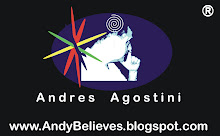
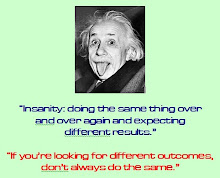




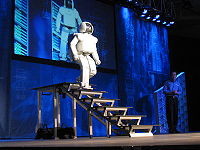













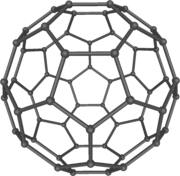













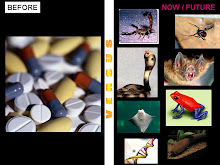




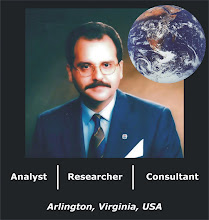



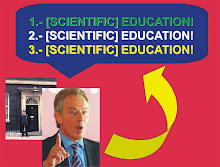
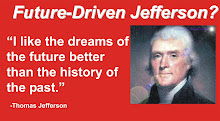
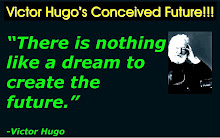
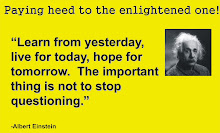
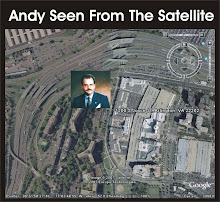
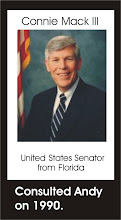

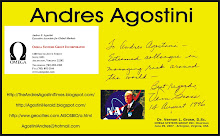
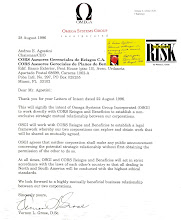




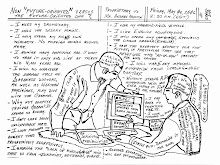
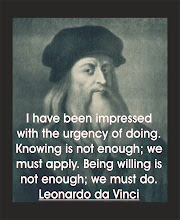




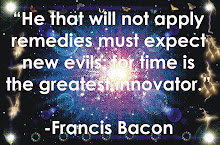











No comments:
Post a Comment